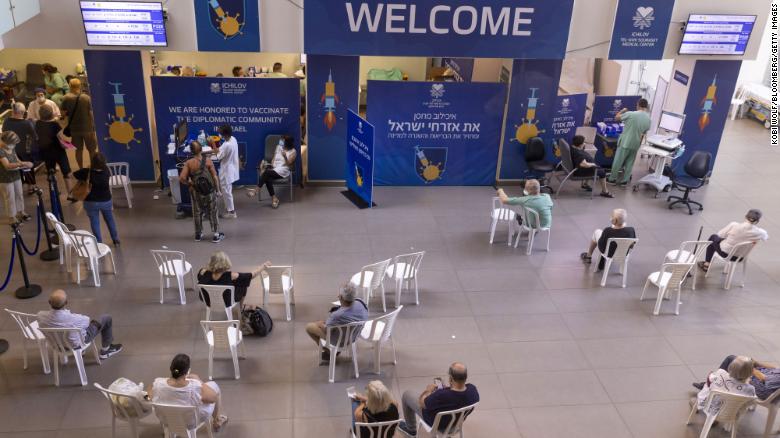CDC Approved Booster Dose Keys 1:28
(CNN) -
When it comes to covid-19, it seems that where Israel rules, the rest of the world follows.
For nearly a year, the country has offered other nations a glimpse into the future of the pandemic.
Israel has been at the forefront of the deployment of adult and adolescent vaccines, pioneered the creation of a vaccine passport, and, in recent months, spearheaded the use of booster vaccines.
At the end of July, the country began offering reinforcements to those over 60;
Since the end of August, the boosters are available to anyone over the age of 16, five months after their second dose of the vaccine.
Now, in Israel, a person is not considered fully vaccinated until they have received a third dose of the vaccine, once they meet the requirements for it.
More than three months later, Israel's health authorities say the data is clear: the booster vaccines helped reduce the fourth wave of the virus that swept through the country in August and September.
At its peak, that wave registered more than 8,000 new cases of Covid-19 a day, and more than 500 people simultaneously hospitalized in serious condition.
advertising
The current seven-day average ranges between 450 and 500 daily cases, and there are 129 people hospitalized in serious condition due to the virus.
The data highlight the marked differences between those vaccinated, and those who have the booster, and those who do not: in many days of the past month, more than 75% of the positive cases occurred among those not vaccinated, according to data from the Ministry of Health .
Among those hospitalized with covid-19 the situation is even clearer: the Israeli authorities affirm that in October the rate of people over 60 years of age in serious condition who had only received two doses of the vaccine was 5 times higher than that of those who they had three shots.
And although the number of cases has generally decreased since then, the differences remain: On Sunday, there were four times as many people over 60 in serious condition who had only been vaccinated with two doses, compared to those who are considered fully vaccinated with three doses, according to the Ministry of Health.
Lessons from Israel
Elderly residents wait to receive their third dose of the Pfizer-BioNTech COVID-19 vaccine at a Tel Aviv medical center on August 2.
Dr. Anthony Fauci, director of the US National Institute of Allergy and Infectious Diseases, has cited this data as one reason why he believes that everyone will soon be recommended to receive the booster doses once they are eligible. .
"If we look strictly at the data from Israel, it is very clear that the differences in the weakening of immunity are much more profound in the elderly, but they occur in all cases," Fauci told NBC last week.
Israel's lesson is one that more and more countries are taking up, especially as cases rise to worrying levels in parts of Europe.
Germany recommends a third dose of the vaccine for everyone over the age of 18, and in the UK, boosters are available to everyone over 40 from this week.
"Booster Dose Reduces Chances" of Covid with Symptoms by 95%, Says Dr. Huerta
In France, the demand for booster vaccines soared after President Emmanuel Macron announced that a third dose would be required to revalidate the "pass sanitaire", or health card, which is required on public transport and to enter a variety of public and private spaces.
And in the United States now reinforcements are authorized for everyone over 18 years of age.
Health experts say that the deployment of booster vaccines in many Western countries highlights the inequality in the implementation of vaccines in other parts of the world.
In the UK, 88% of people over the age of 12 have received their first dose of the vaccine;
80% have received two doses, and 26% have already received a booster, according to data from November 20.
On the contrary, only 10% of the inhabitants of African countries have been vaccinated for the first time, according to data from Our World In Data;
only 7% of Africa is fully vaccinated, according to the data.
The fears of a fifth wave
But the news from Israel is not entirely good: Although the number of cases has decreased since September, the decline has stalled.
And, what is even more worrying, the R rate, the average number of people infected by each person with covid-19, once again exceeded 1, according to data from the Ministry of Health, a worrying sign that the virus may be spreading again.
Health experts, such as Professor Eran Segal of Israel's Weizmann Institute, say it is too early to tell if the country is entering a fifth wave of the virus.
But they point to the fact that nearly 1.5 million people who have received two doses of the vaccine have not been vaccinated again.
"There are more people whose vaccine has faded over time, compared to the number of new vaccines and boosters, which has led to a slow decline in [the population's] total immunity," Segal tweeted last week.
Israel reopens its borders to vaccinated tourists 2:17
Now Israel is working to stop that possible fifth wave: the authorities are encouraging the unvaccinated to get vaccinated, and those who can receive booster doses to do so.
They are also vaccinating children and maintaining preventive measures.
Many of the new infections in Israel occur in children between the ages of 5 and 11, according to the country's health authorities, so a campaign began on Monday to vaccinate that group.
"About 50% of our daily infections occur in that age group, below the age of 11," Dr. Ran Balicer, chairman of Israel's National Panel of Experts on covid-19, told CNN last Friday.
"We believe that this vaccination campaign could turn the tide and perhaps return us to the downward trend if we have a good rebound [in vaccinations], as we hope will happen."
But even with a highly vaccinated population, health experts say it is vital that measures against COVID-19 remain in place, especially during the winter when activities move indoors.
Nachman Ash, director general of Israel's Ministry of Public Health, told Israel Channel 13 that part of the reason for the increase in cases is that people do not respect rules such as the use of masks.
"Enforcing the rules is not enough," Ash said.
"And I see that the public is relaxing as time goes on and the infection rate goes down, so people are less careful. So, yes, we have to increase law enforcement."
Balicer cautioned that ignoring the lowered immunity of those who have received two doses of the vaccine "may actually put people at risk with false peace of mind."
"There is not a single magic bullet that is enough to ensure the prevention of the surge, especially in the winter time," said Balicer.
"It is about a combination of measures: use of masks indoors, behavior of the population, restrictions on indoor events and green passes, and an effective reinforcement campaign."
Israelvaccine against covid-19









